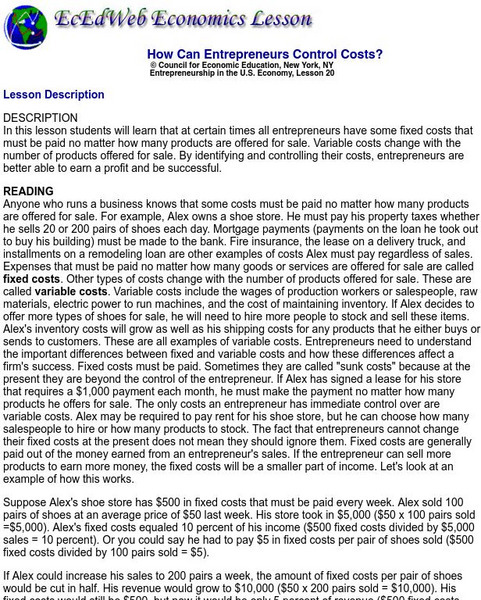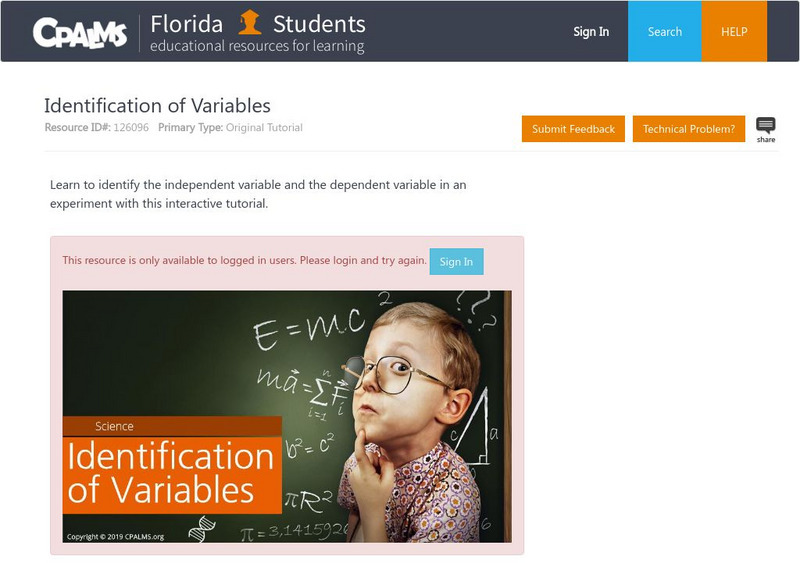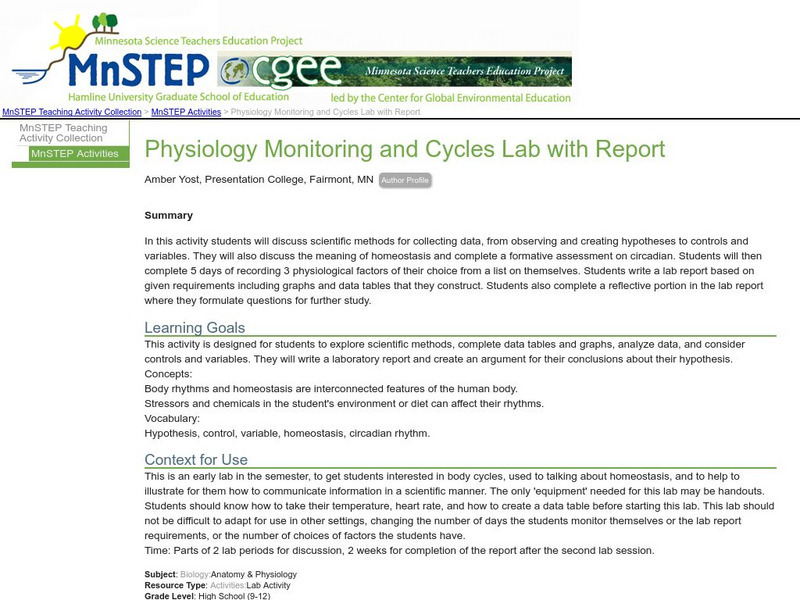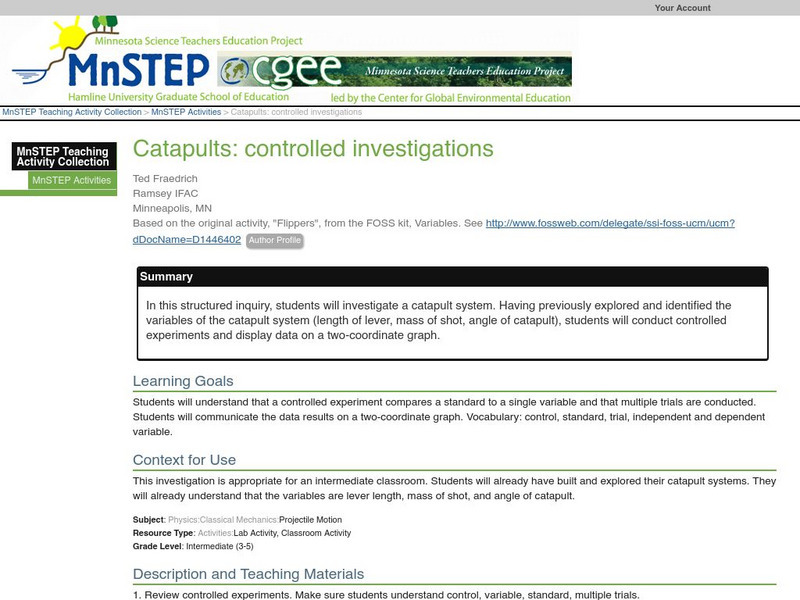Hi, what do you want to do?
Sophia Learning
Sophia: Control and Variable Groups: Lesson 3
This lesson will explain the difference between a control group and variable groups, when using the scientific method. It is 3 of 4 in the series titled "Control and Variable Groups."
Sophia Learning
Sophia: Control and Variable Groups: Lesson 4
This lesson will explain the difference between a control group and variable groups, when using the scientific method. It is 4 of 4 in the series titled "Control and Variable Groups."
Sophia Learning
Sophia: Control and Variable Groups: Lesson 1
This lesson will explain the difference between a control group and variable groups, when using the scientific method. It is 1 of 4 in the series titled "Control and Variable Groups."
Better Lesson
Better Lesson: Force and Motion Investigation
Conduct an investigation collaboratively on the effect of force applied on an object to produce data to serve as the basis for evidence, by using fair tests in which variables are controlled and the number of trials are considered.
Biology Corner
Biology Corner: Identifying Variables in an Experiment
Students analyze different experiments to determine independent variables, dependent variables and control groups.
Science Education Resource Center at Carleton College
Serc: Investigating Motion: Calculating and Graphing Students Walking Speed
In this activity students will collect and analyze data of their walking speed. They will compare their speed to an outside speed walker. They will determine their speed every 20 meters up to 100 meters. They will complete five trials to...
Sophia Learning
Sophia: Independent/dependent Variables: Lesson 2
This lesson will explain the difference between independent and dependent variables. It is 2 of 4 in the series titled "Independent/Dependent Variables."
Sophia Learning
Sophia: Independent/dependent Variables: Lesson 3
This lesson will explain the difference between independent and dependent variables. It is 3 of 4 in the series titled "Independent/Dependent Variables."
American Chemical Society
Inquiry in Action: Crushing Test
This lab activity will have students crushing crystals to learn about variables and the importance of controlling those variables. Lab activity includes student and teacher instructions.
Science Buddies
Science Buddies: Scientific Method Variables/hypothesis
Find out what variables are in a scientific investigation and what the difference is between an independent, dependent, and controlled variable. Look at samples of different types of variables and find out what makes a good variable.
University of Nebraska Omaha
Ec Ed Web: How Can Entrepreneurs Control Costs?
This economics lesson explores what influences producers to supply in regard to demand. It examines fixed and variable costs, how such costs can be reduced, and how they influence production. Includes printable worksheets.
CPALMS
Florida State University Cpalms: Florida Students: Identification of Variables
An explanation of how dependent and independent variables are used during experimentation.
TeachEngineering
Teach Engineering: Are You in Control?
This lesson teaches the engineering method for testing wherein one variable is changed while the others are held constant. Learners compare the performance of a single paper airplane design while changing the shape, size and position of...
Science Education Resource Center at Carleton College
Serc: Investigating Calculating the Effect of Mass, Length and Displacement
In this physics lab activity students investigate how mass, length and angular displacement affect the period of a simple pendulum. Students control variables, testing one variable at a time, using manual techniques (stopwatch, human...
Science Education Resource Center at Carleton College
Serc: Physiology Monitoring and Cycles Lab With Report
Using physiology monitoring, students will understand how to collect data using scientific methods in this activity. Students will also learn how to communicate the finding in a lab report. Physiology monitoring will include measuring...
Khan Academy
Khan Academy: Storing Strings in Variables
When we're making a program, we often want to store sequences of letters. In programming lingo, we call each letter a character and we call the sequence a string.
Annenberg Foundation
Annenberg Learner: The Control a Haber Bosch Ammonia Plant
An activity where students try to optimize profits by producing the largest daily output of ammonia by simulating the Haber-Bosch process. Students will use their knowledge of equilibrium reactions and the effects of variables like...
Khan Academy
Khan Academy: Polygenic Inheritance and Environmental Effects
Learn about traits that are controlled by multiple genes and/or influenced by the environment. Understand penetrance and expressivity.
Sophia Learning
Sophia: Independent/dependent Variables: Lesson 1
This lesson will explain the difference between independent and dependent variables. It is 1 of 4 in the series titled "Independent/Dependent Variables."
Cosmo Learning
Cosmo Learning: Control Engineering
A collection of video lectures from an industrial control course taught at the National Programme on Technology Enhanced Learning. The course teaches basic characteristics of feedback control systems, frequency-response analysis, and...
TeachEngineering
Teach Engineering: Obi Wan Adobe: Engineering for Strength
Students conduct an experiment to determine how varying the composition of a construction material affects its strength. They make several adobe bricks with differing percentages of sand, soil, fibrous material and water. They test the...
Science Education Resource Center at Carleton College
Serc: Catapults: Controlled Investigations
In this structured inquiry, students will investigate a catapult system. Having previously explored and identified the variables of the catapult system (length of lever, mass of shot, angle of catapult), students will conduct controlled...
TeachEngineering
Teach Engineering: Students as Scientists
This curricular unit contains two lessons that let students actually do the work of scientists as they design their own experiments to answer questions they generate. In the first lesson and its associated activity, students conduct a...
Cengage Learning
Cengage Learning: Project Based Learning: Egg Drop Experiment
Students are challenged to design a way to drop a raw egg from varying heights without letting the egg break. Creative thinking and evaluation of results are critical to the project.


























